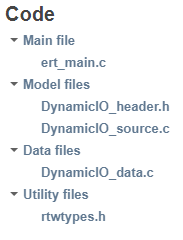自定义生成的文件名
此示例说明在使用紧凑文件打包时如何为生成的头文件和源文件指定自定义名称。
代码生成器在代码生成和构建过程中创建 model.* 文件。当您为基于 ERT 的模型生成 C/C++ 代码时,您可以自定义生成的标头、源和数据文件的名称。您不能自定义引用模型生成的文件。自定义文件名使您能够:
遵守公司或行业的命名标准。
与外部代码集成。
在配置参数对话框的代码生成 > 代码放置窗格中,使用自动生成的文件命名规则组自定义生成的文件的名称。当您使用 Modular 或 Compact(with separate date file) 文件打包时,您可以为生成的标头、源和数据文件指定自定义名称。当您使用 Compact 文件打包时,您可以为生成的头文件和源文件指定自定义名称。
1.打开基于 ERT 的模型 DynamicIO。在配置参数对话框中,将系统目标文件更改为 ert.tlc。
open_system('DynamicIO')

2.在代码生成 > 代码放置窗格中,选择文件打包格式为 Compact(with separate date file)。
3.使用这些参数的命名规则指定自定义文件名:
头文件:
$R$E_header源文件:
$R$E_source数据文件:
$R_data
$E 对于头文件和源文件是必需的。$E 代表以下文件类型实例:
capicapi_hostdttestinterfaceprivatetypes
4.要构建模型,请按 Ctrl + B。在代码生成报告中,生成的文件列在左侧窗格中的模型文件和数据文件部分。

生成的头文件解析为具有 $E 和自定义文本 header 值的模型名称。生成的源文件解析为带有自定义文本 source 的模型名称。生成的数据文件解析为带有自定义文本 data 的模型名称。以下是所应用的命名规则和相应生成的文件的摘要:
